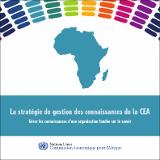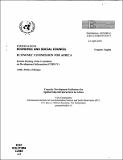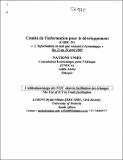Women and information communication technologies: setting the context for information literacy programme and social change in Cameroon

View
Download
Published
2007-04Author(s)/Corporate Author (s)
Endeley, Joyce B.;United Nations. Economic and Social Council;
United Nations. Economic Commission for Africa;
International Federation of Library Associations and Institutions;
Metadata
Show full item recordAbstract
The Australian Library and Information Association (ALIA) define information literacy as the ability to identify, locate, access, evaluate and apply the needed information. Such a definition highlights the importance of human (teachers, librarians etc) and infrastructure resources (information communication technologies like - television, radio, internet etc) in the construction of an 'information literate society'. These resources contribute to the acquisition and effective use of information by the entire population. Unfortunately, in the process of knowledge acquisition and exposure, women, poor and rural are most disadvantaged because they constitute a larger proportion of the population with low level or no formal education, a resource that is vital in exploiting information. By implication they are deprived of knowledge and skills to effectively participate in the decision-making process to shape their destiny and development of their family, community and nation as a whole. This paper explains the above phenomenon using thesis, NGOs, government and field placement reports on gender/women and ICTs in Cameroon. It uses data from these reports and other secondary literature to justify the need for information literacy programme, since 'information is power'. ICT is considered an entry point for information literacy/Tele-centre to identify, locate, access, evaluate and apply needed information to foster social transformation and inclusive development.
Citation
“Endeley, Joyce B.; United Nations. Economic and Social Council; United Nations. Economic Commission for Africa; International Federation of Library Associations and Institutions (2007-04). Women and information communication technologies: setting the context for information literacy programme and social change in Cameroon. UN. ECA Committee on Development Information Meeting (5th : 2007, Apr. 29 - May 04 : Addis Ababa, Ethiopia). Addis Ababa :. © UN. ECA,. https://hdl.handle.net/10855/271”Conference
UN. ECA Committee on Development Information Meeting (5th : 2007, Apr. 29 - May 04 : Addis Ababa, Ethiopia)Collections
- Gender [2597]
- Information Communication Technology [971]
- Libraries, Information and Knowledge Management [1987]
- Science and Technology [1364]
- Social Development [6618]
Related items
Showing items related by title, author, creator and subject.
La stratégie de gestion des connaissances de la CEA: gérer les connaissances d’une organisation fondée sur le savoir
Nations Unies. Commission Economique pour l'Afrique
“Nations Unies. Commission Economique pour l'Afrique (2014). La stratégie de gestion des connaissances de la CEA: gérer les connaissances d’une organisation fondée sur le savoir. Addis Abeba:. © NU. CEA,. https://hdl.handle.net/10855/22308”
Capacity development indicators for spatial data infrastructures in Africa
United Nations. Economic Commission for Africa
“Georgiadou, Yola; United Nations. Economic Commission for Africa (2005-04). Capacity development indicators for spatial data infrastructures in Africa. Addis Ababa :. © UN. ECA,. https://hdl.handle.net/10855/3423”
Information en tant que ressource économique du 23 au 28 avril 2005
Nations Unies. Commission économique pour l'Afrique
“Nations Unies. Commission économique pour l'Afrique (2005-04). Information en tant que ressource économique du 23 au 28 avril 2005. NU. CEA Conférence du Comité de l'information pour le dévelopment (2005, avr. 23 - 28 : Addis Abeba, Ethiopie). Addis Ababa :. © UN. ECA,. https://hdl.handle.net/10855/18868”



